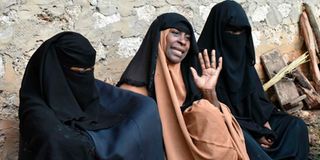Kwale ‘widows’ seek compensation over husbands’ disappearance

Ms Mariam Mwanyihaji (left), her in-law and neighbour during the interview at her home in Ng’ombeni, Kwale County. Her husband, Athman Suleiman, has not been seen since June 17, 2021 when he was abducted by masked men at their house.
Several women in Kwale County claiming to be widows have asked the government to compensate them, saying security agents had abducted and killed their husbands.
The women say the men were the sole breadwinners in their families, and that the families have been impoverished by the disappearances.
The leader of the group, Siajab Rashid, of Bongwe, said since her husband was shot dead in a vehicle several years ago by people suspected to be police, the family does not know who killed him.
“How come the government that claims that it does not know who killed my husband is the same one that has failed to investigate since I reported his death?” she said.
“There are also many prisons that he would have been taken to if he was a criminal.”
Ms Rajab said it had been difficult taking care of her 13 children. She said children in similar circumstances were joining criminal gangs to earn money and support their mothers.
Dzivwa Zaituni, another widow, said the government should provide support for widows.
“We do not have jobs and we depend on well-wishers to support us. We have also been rejected by the families of our husbands,” said Ms Zaituni, who leads some of the women in small businesses.
More than 500 women in Kwale live as widows after their husbands were abducted from their homes by unknown men, suspected to be police officers, for being in contact with terrorists in neighbouring countries.
The United Green Movement (UGM) party has echoed the widows’ demands for compensation.
UGM leader Agostino Neto criticised the government, saying that besides compensation, the suspects should be given fair trials instead of being killed.
“Enforced disappearances in the Coast region should not be taken lightly. The widows have children to take care of,” he said.
“The government should think about it and consider a reparation programme, social safety nets and grants for them, now that they have made them widows, because the Kenyan Constitution anticipates that there is a place for social safety nets.”
He was speaking in Bongwe when he visited the widows during the party’s Coast tour. The party gave the widows food items.
Through small support groups, some of the women have started small businesses such as extracting oil from dried coconuts for sale.
Zainab Chitsangi, a UGM member in Kwale, said proper policies are needed to ensure that the rights of the widows are considered.
This includes bursaries for orphans, who should present the death certificates of their deceased parents as proof of death.
“That is why you find that most of these children have dropped out of school and joined criminal gangs. Some are also tempted to take revenge for what happened to their fathers, who disappear and are never heard of,” Ms Chitsangi said.
Most of the widows lead impoverished lives. They also face socio-economic challenges arising from conflicts with their extended families, such as inability to inherit property and the stifling of their rights to remarry.
Human rights organisations have been calling for fair trials for suspected terrorists, saying it was important for courts to identify them as criminals so they could be tried.
Other areas in the Coast region affected by extrajudicial killings and enforced disappearance are Mombasa, Kilifi and Lamu counties.





